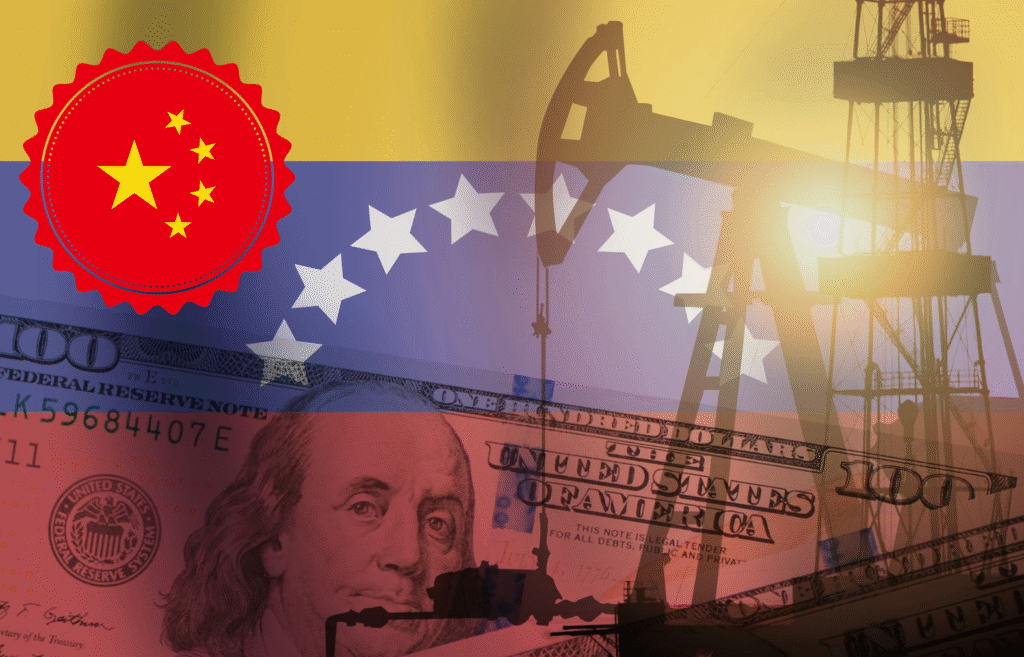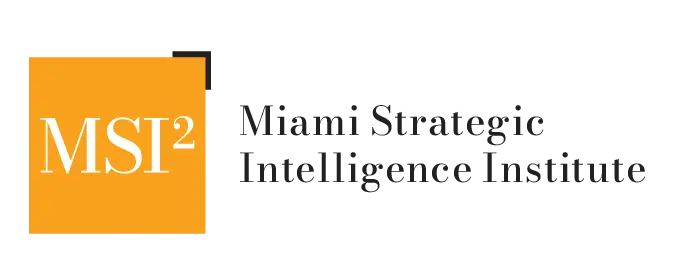03 Jun Sanctions, Shadow Fleets, and Strategic Leverage: Why the U.S. Must Hold the Line on Venezuela
By,
Jesús Romero. Co-Founder & Senior Fellow, MSI²
Introduction: As U.S. sanctions tighten their grip on Venezuela’s oil sector, most notably with the expiration of Chevron’s license, Beijing is positioning itself to capitalize on Washington’s retreat.
With over $60 billion in outstanding loans extended to the Maduro regime over the past two decades, China has a clear objective: reclaim its debt and deepen its influence over Venezuela’s vast energy reserves.
But contrary to the narrative pushed by some in the U.S. oil industry—including figures like Harry Sargeant—China may not be the immediate threat it’s portrayed to be. The real strategic error would be lifting sanctions prematurely and enabling a criminalized regime to regroup, rearm, and reassert regional influence.
The Sanctions Debate: Signal or Surrender?
Vice President Delcy Rodríguez recently claimed that Venezuela’s oil production remains at “100 percent” despite the revocation of U.S. licenses. However, independent data tells a different story. According to OPEC secondary sources, Venezuela produced approximately 888,000 barrels per day in April 2025, well below the regime’s official narrative (OPEC, 2025).
In fact, it was the Biden administration that first reopened the door to Venezuela’s sanctioned oil sector by issuing General License 41 in November 2022, granting Chevron limited authority to resume oil extraction and export operations in partnership with PDVSA. This concession, framed as a good-faith gesture to encourage democratic reforms and electoral negotiations, effectively allowed a U.S.-based company to bypass sanctions while the broader embargo remained in place (Thompson Hine, 2025). Critics argued that the move undermined the sanctions regime’s credibility and signaled to international actors—including China and Iran—that the United States was willing to bend its own rules when commercial interests aligned. The Maduro regime capitalized on this opening to strengthen its position without delivering meaningful political concessions, culminating in the Biden administration’s partial reimposition of sanctions in 2024—a tacit admission that the strategy had failed.
Venezuela’s oil industry, while still functioning at a moderate production level, faces a growing logistical bottleneck: limited domestic storage capacity. With international buyers restricted and major U.S. and European refiners sanctioned or withdrawn, PDVSA is rapidly approaching maximum storage limits. Without consistent export channels, the regime will soon face a glut of unsellable crude, forcing it to offload oil at steep discounts to second-tier buyers—often through shadow intermediaries tied to China, Iran, or rogue trading firms. This will not only reduce state revenue but will also present another handicapping challenge to the regime, exposing its economic vulnerability and deepening its reliance on illicit networks.
Despite public claims by the Maduro regime that oil production is stable or at “100 percent,” many analysts and firsthand observers believe Venezuela is producing far less than reported. This internal shortfall not only impacts its export revenue but also affects its ability to supply subsidized oil to key allies such as Cuba. Most notably, Mexico has stepped in to provide oil shipments to the island, quietly filling the gap and raising questions about regional complicity in sustaining authoritarian regimes through energy diplomacy.

China’s Calculated Patience
China’s play is long-term and calculated. Through joint ventures with PDVSA and debt repayment schemes tied to oil, Beijing quietly expands its foothold. Yet, China is not offering a lifeline for free; it is leveraging Venezuela’s desperation to secure long-term energy assets and geostrategic alignment. While the U.S. debates internal consistency in its policy, China makes steady inroads.
While the Venezuelan regime can offer oil fields to China as a form of repayment for its mounting debt, such transfers still face a legal constraint under Venezuelan law: all foreign participation in oil production must occur through joint ventures in which the state-owned company PDVSA retains a controlling stake (Ley Orgánica de Hidrocarburos, 2001). This means that China cannot fully own or independently control strategic energy assets, limiting its operational freedom and creating long-term friction between commercial interests and sovereign protections.
Shadow Fleets and Rogue Networks
Behind the scenes, Venezuela’s survival depends increasingly on the gray and black maritime fleets, a network of shadow tankers that operate without transponders, under falsified registries, and in alliance with sanctioned actors like Iran and Russia. These vessels have been instrumental in laundering sanctioned oil, evading maritime monitoring, and financing state-run criminal operations through hidden oil sales. This is not traditional commerce; it is state-sponsored evasion (FinCrime Central, 2025).
Strategic Recommendation
The Trump administration must pair crippling sanctions not only against Venezuela but also against those countries and companies enabling its survival. This includes sanctioning foreign ports, insurers, and shipowners that knowingly service Venezuela’s shadow fleet operations; enforcing secondary sanctions on Chinese, Turkish, Russian, and Iranian enablers; and deploying U.S. naval and satellite capabilities to expose and intercept illicit maritime activity.
The U.S. administration may need to reassess the issuance of licenses and waivers to U.S. companies such as Chevron and energy brokers like Harry Sargeant, who have operated in Venezuela under special exemptions. While framed as economic or humanitarian allowances, such concessions have in practice enabled these actors to function as intermediaries for a criminal regime, one deeply implicated in narcotrafficking, repression, and corruption. These relationships risk legitimizing the Maduro government, providing it with revenue streams and credibility it would otherwise lack under a full-spectrum sanctions regime.
While the Trump administration has officially allowed Chevron to remain in Venezuela under a narrow authorization barring oil production or exports, the justification that this protects U.S. interests “without providing financial support to the Maduro regime” rings hollow. In practice, this represents a form of geopolitical duality: a selective enforcement of sanctions that favors corporate preservation over policy clarity. It sends mixed signals to allies, adversaries, and Venezuelan citizens alike. If the goal is to choke off the regime’s economic oxygen, then the U.S. should not simultaneously keep its own energy companies parked inside the system that props it up—however dormant their operations may seem.
Conclusion
This is not just about Venezuela—it’s about hemispheric security. The erosion of U.S. credibility in the Western Hemisphere emboldens autocrats and adversaries alike. Sanctions must not only remain—they must expand. The alternative is a criminalized regime in Caracas acting as a proxy for powers that seek to challenge the United States not just globally, but in its own backyard.
References
FinCrime Central. (2025, May 22). Iranian oil smuggling & the shadow fleet. https://fincrimecentral.com/iranian-oil-smuggling-shadow-fleet-sanctions/
OPEC. (2025). Monthly Oil Market Report – April 2025. Organization of the Petroleum Exporting Countries. https://www.opec.org/opec_web/en/publications/338.htm
Thompson Hine LLP. (2025, March 28). Reversing the Biden Administration: OFAC Announces the Wind Down of Venezuela General License 41. https://www.thompsonhine.com/insights/alerts/2025-03-28-reversing-the-biden-administration-ofac-announces-the-wind-down-of-venezuela-general-license-41
Ley Orgánica de Hidrocarburos, Gaceta Oficial Nº 37.323, República Bolivariana de Venezuela (2001). https://www.pdvsa.com/images/pdf/leyhidrocarburos.pdf
The opinions expressed in this article are those of the author and do not necessarily reflect the views of the Miami Strategic Intelligence Institute (MSI²).
